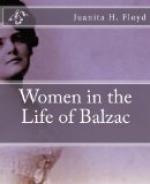This marriage project, like many others planned either for or by Balzac, came to naught, and his mother evidently became displeased with him, for she left him on his return, when he was in great need of consolation and sympathy. As frequently happened under such circumstances, Balzac expressed his deep regrets at his mother’s conduct to one of his best friends, Madame Carraud, and confided to her his loneliness and longings.
Madame de Balzac was much occupied with religious ideas, and had made a collection of the writings of the mystics. Balzac plunged into the study of clairvoyance and mesmerism, and his mother, interested in the marvelous, helped him in his studies, as she knew many of the celebrated clairvoyants and mesmerists of the time.
At various times, Balzac’s relations with his mother were much estranged; at one time he did not even know where she was. When she was disappointed in her favorite child, Henri, she seemed to recognize the great wrong involved in her lack of affection for Honore and his sister Laure. But she never gave him the attentions that he longed for. In May, 1840, he wrote to Madame Hanska that he was especially sad on the day of his fete catholique (May 16) as, since the death of Madame de Berny, there was no one to observe this occasion, though during her life every day was a fete day; he was too busy to join with his sister Laure in the mutual observance of their birthdays, and his mother cared little for him; once the Duchesse de Castries had sent him a most beautiful bouquet,—but now there was no one.
The same year (1840) he took his mother to live with him Aux jardies. This he regarded as an additional burden. Her continual harassing him for the money he still owed her, her nervous and discordant disposition, her constant intrigues to force him to marry, and her numerous little acts that placed him in positions beneath the dignity of an author’s standing were an incessant source of annoyance to him.
She did not remain with him long, but he tried to perform his filial duties and make her comfortable, as various letters show. One of these reads as follows:
“My dear Mother,—It is very difficult for me to enter into the engagement you ask of me, and to do so without reflection would entail consequences most serious both for you and for myself. The money necessary for my existence is, as it were, wrung from what should go to pay my debts, and hard work it is to get it. The sort of life I lead is suitable for no one; it wears out relations and friends; all fly from my dreary house. My affairs will become more and more difficult to manage, not to say impossible. The failure of my play, as regards money, still further complicates my situation. I find it impossible to work in the midst of all the little storms raised up in a household where the members do not live in harmony. My work has become feeble during the




